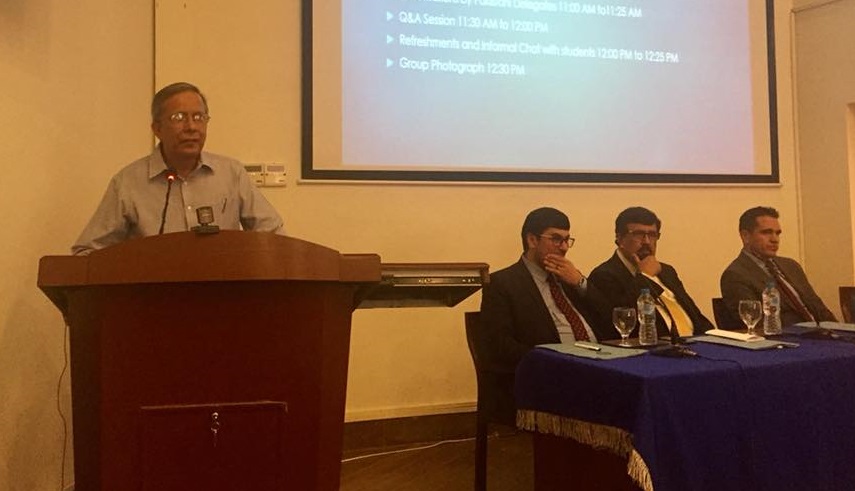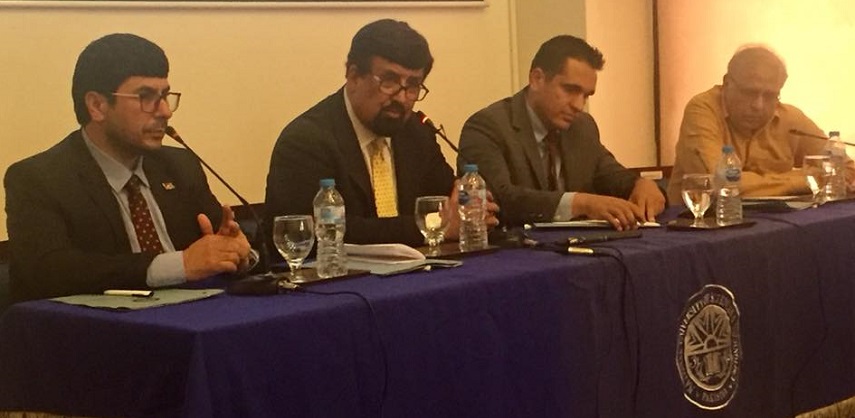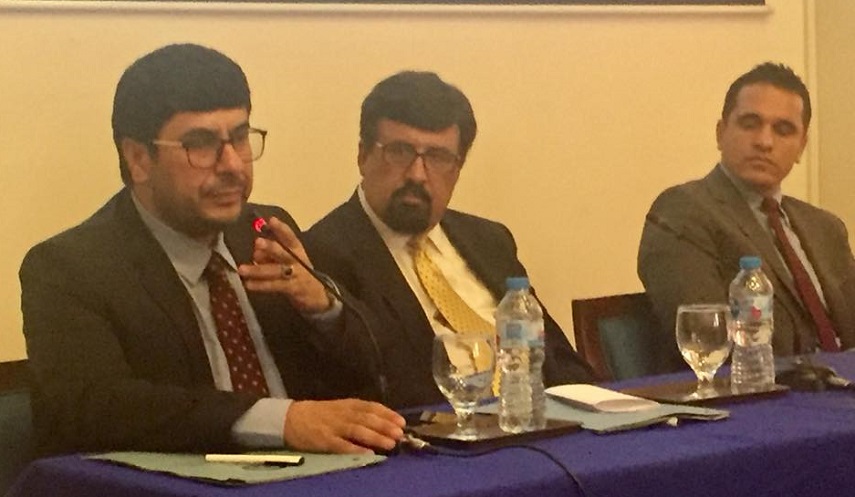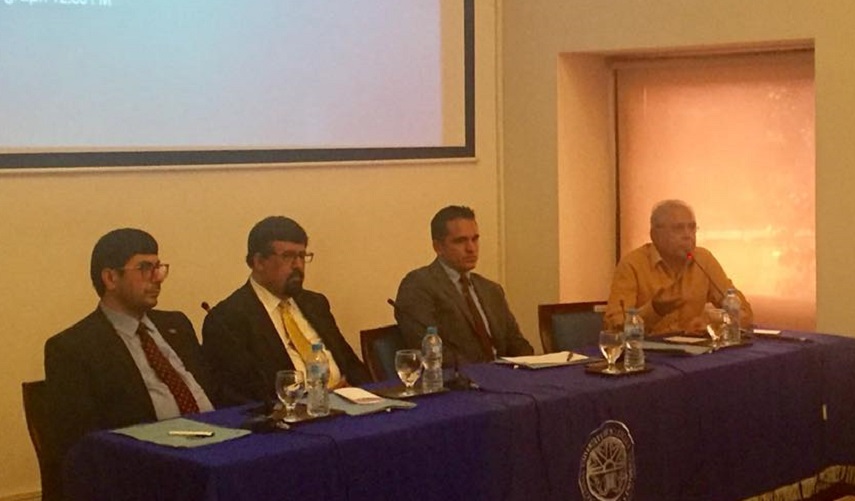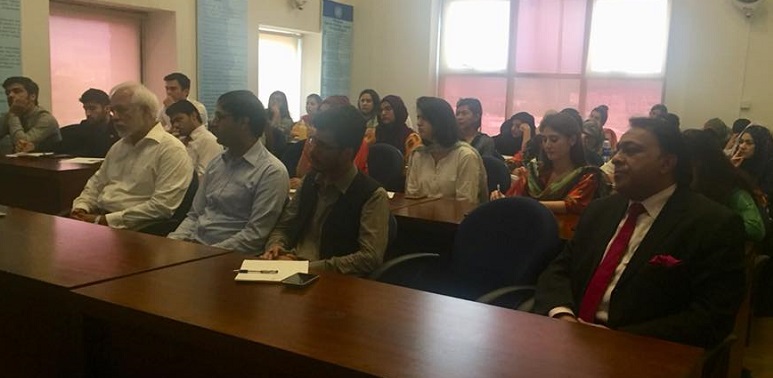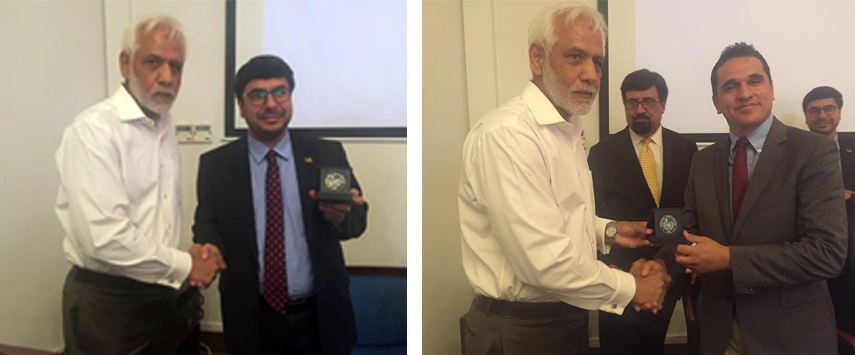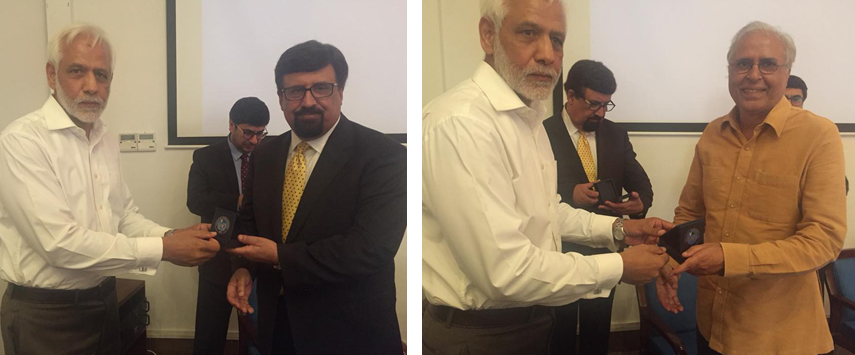As part of the CRSS – SaferWorld – OESP project Beyond Boundaries Phase III, a Pak-Afghan Track 1.5/II series of dialogues and outreach, the fourth meeting of the Pakistan Afghanistan Joint Committee (PAJC), was held at Islamabad from September 05-08, 2018. During the Afghan delegation’s visit to Islamabad as part of outreach and university interaction planned for the group, three Afghans and a Pakistani Delegate from the PAJC visited the National University of Science and Technology (NUST), Islamabad on September 07, 2018.
The Afghan speakers included former Minister of Rural Rehabilitation and Development (MRRD) Mr. Jarullah Mansoori, Representative to the Chief Executive Officer (CEO) Dr. Abdullah Abdullah on Migration Affairs Faridoon Sikander and senior Afghan Parliamentarian Khalid Pashtoon, while former Ambassador Mian Sanaullah was the Pakistani speaker. CRSS was represented by Aized Ali, Project Director Beyond Boundaries and Saddam Hussein, Research Fellow at CRSS.
The PAJC group was greeted and welcomed by Dr. Tughral Yamin, Associate Dean, Center for International Peace and Stability (CIPS), NUST. He thanked CRSS to have arranged such an important interaction for the students to talk about Pak-Afghan relations and understand better the issues with an open mind and neutral perspective. He also stated that such a healthy discussion would give the students numerous themes for research. Other faculty members and about 35-40 male and female students from the center participated in the dialogue. The dialogue comprised presentations by the members from both sides, followed by an interactive Question and Answer (Q & A) session. Among the students, about 60 percent were female students and 30 percent were male students.
Speaking first from the Afghan side, Khalid Pashtoon thanked Dr. Yamin for inviting the PAJC members and also expressed his gratitude to CISP and NUST. He also briefed the students about Beyond Boundaries initiative and importance of track 1.5/II initiative for people to people dialogue and to lobby and put pressure on both governments with the objective of improving bilateral relations. Pahtoon said that Beyond Boundaries initiative was taken with an aim and commitment by both sides to pursue a new dialogue framework. This bilateral interaction includes interactive discussions on regional peace and stability, enhancing Pak-Afghan economic relations, preventing negative narratives to build trust between public and private sectors of both the countries. In short, the objective was to create a better environment in terms of social, political and economic ties. So far, the results of the initiative are impressive as both sides have agreed on many things during the course of time. He apprised the students that Afghans have been struggling for so long, but it seems that times have changed; youth is a hope and also are the future leaders. Youngsters ought to work together for peace and development.
Jarullah Mansoori, putting his view forward, said that the people of Pakistan and Afghanistan have always enjoyed brotherly relations for centuries. Both countries had hard issues too in the near past, but every relation is crafted in the context of a specific time. These are modern times with contemporary necessities. It is time we change people’s perceptions from negative to positive, in order to kick-start the transition towards peace and prosperity.
Speaking from Pakistani side, Ambassador Mian Sanaullah said that both the nations have to treat each other equally and live as two neighbors based on mutual interests and not on basis of religious solidarity, because that type of relationship is not sustainable. Commenting on India’s role in Afghanistan, Sanaullah opined that India
lens of Pakistan is misperceived one; Afghanistan should have the right to have relations with anyone it want. Pakistan can just request Afghanistan and make sure within its own domain that Indian factor in Afghanistan does not affect Pakistan’s national security. He also held the view that youth of Pakistan and Afghanistan has to play a positive role otherwise the future will remain dark.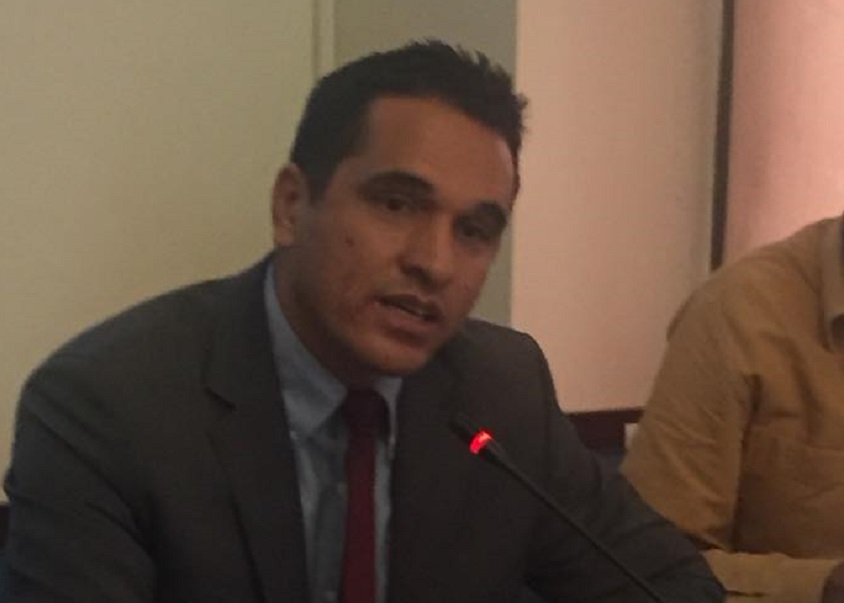
Fariddun, while thanking CRSS and NUST, showed optimism in youth taking the reins of future. “We are a generation in transition. The future lies in our hands. Afghan conflict is very complex; there are too many variables in the equation to be sorted out. Our job should be to smoothen the process – sorting out this imbroglio. Today’s Afghanistan is a different one; it has gained considerable soft power. It’s the responsibility of youth now to fill the vacuum of ideas and counter-extremist narratives. He then opened the floor for Q & A session.
Students posed many questions to the panelists. The questions broadly included: What are the dynamics of Afghanistan-India relations? Why cultural diplomacy is not a priority? Why Pak-Afghan trade is on the low? What role India can play in Pak-Afghan relations? Responding to the questions the panelist stated that Afghanistan is a sovereign country. It can have relations with anyone it wants, until and unless Afghan land is used for some proxy war. Delegates from both Afghanistan and Pakistan agreed on this. Highlighting cultural diplomacy, the delegates told the audience that this is the area where we should tap into; work in this regard is under way, but it significantly depends on state to state relationship. Commenting on trade, the students were told that there was a lull in bilateral trade; nonetheless, both sides have now agreed on many vital aspects; hence, bilateral trade volume is picking up. Afghan delegates, while answering to the question about India’s role in Pak-Afghan relation said that Pak-Afghan and Indo-Afghan relations are mutually exclusive and are not dependent on one another. It is not India that should play a role, but we should sort out our problems ourselves – between us.
Farrukh Zaman – the principal from NUST – at the end of the session enunciated that Pakistan and Afghanistan are neighbors and it’s a compulsion for them to engage. International relations are very dynamic. They are never in black and white; rather in the shades of grey. We have the common ground to move on. “If you keep looking back, while walking, you will fall”, he added. Afterwards, the Principal presented souvenirs to the Pak-Afghan delegates.

